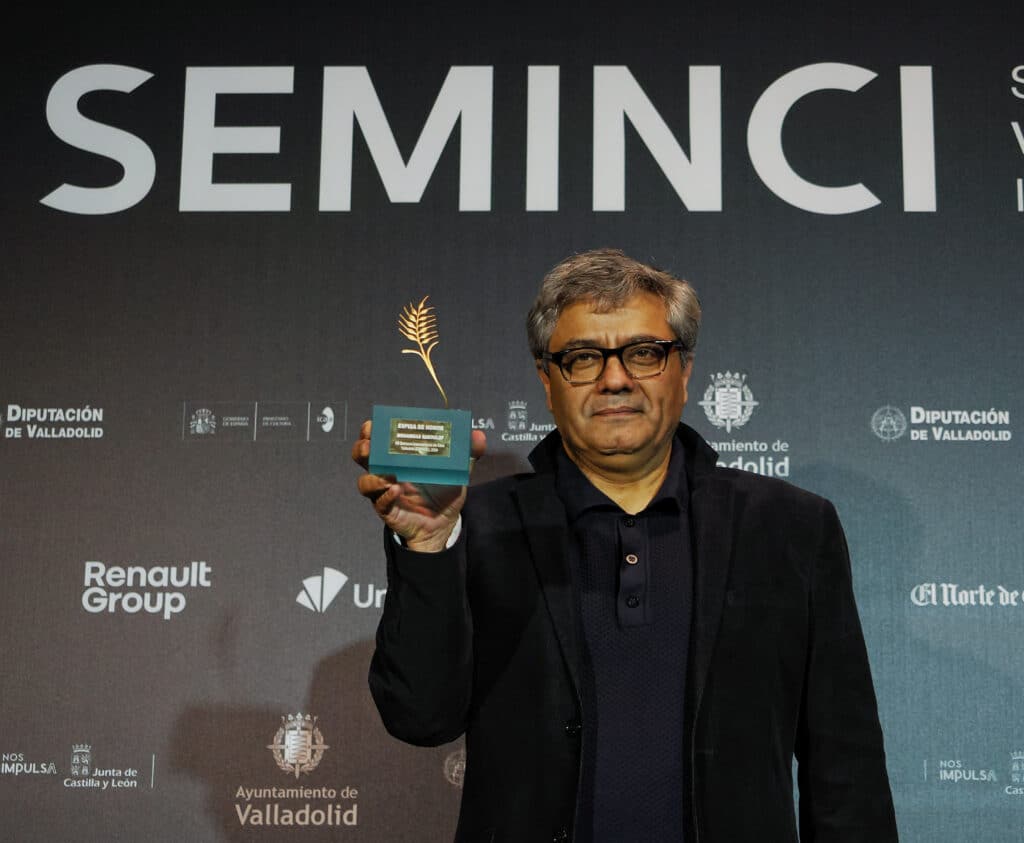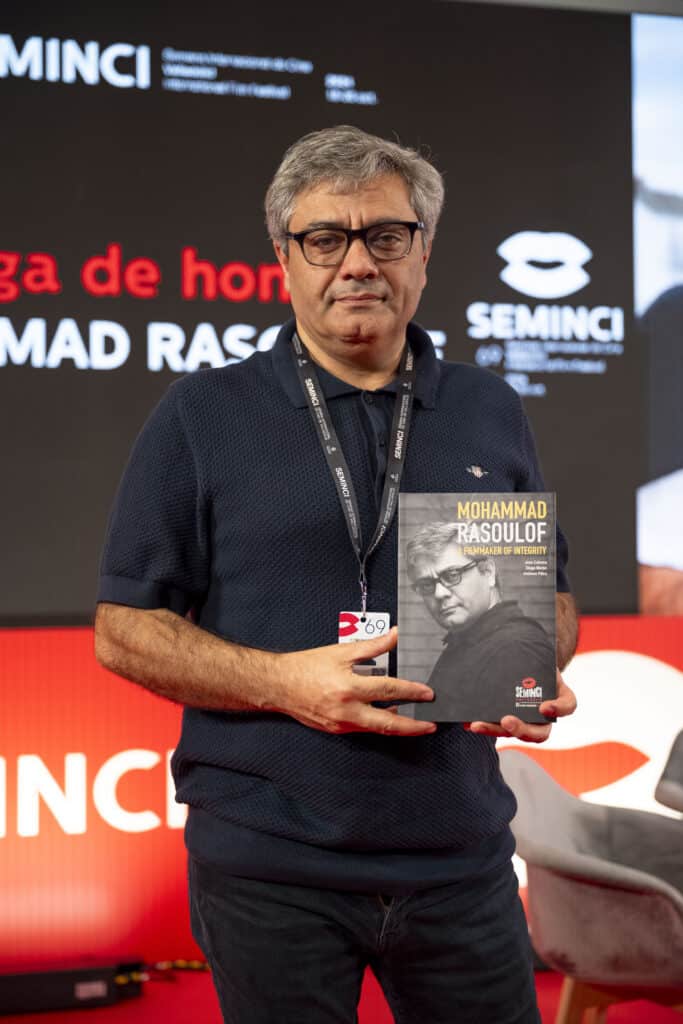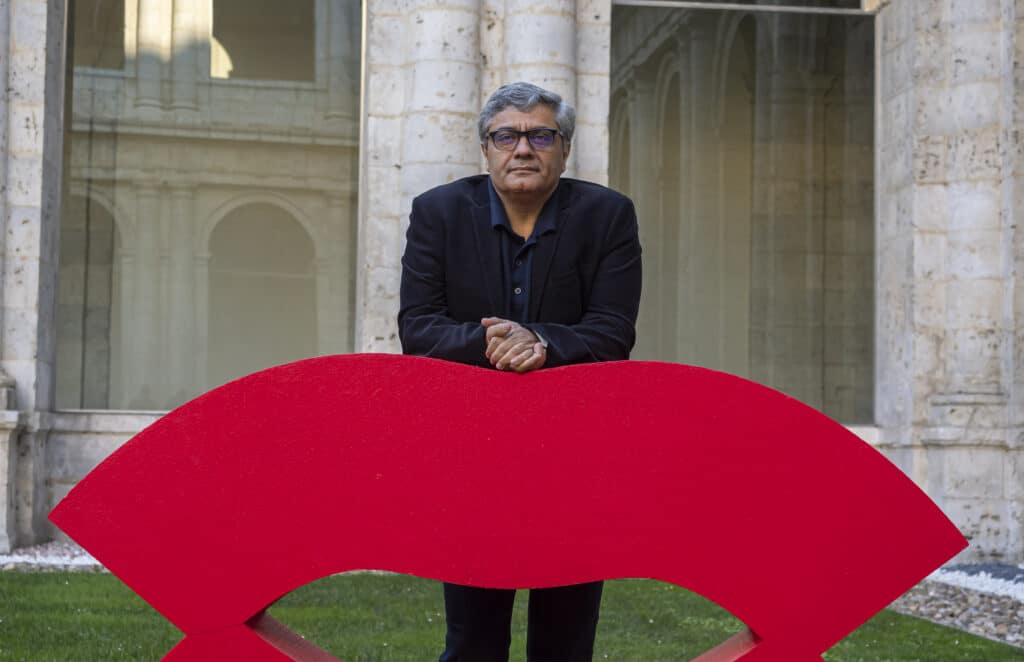- In 2018 the SEMINCI recognised with this honour the work of the Iranian filmmaker, who was able to come to Valladolid six years later to collect the award in person.
- The event took place during the Spanish premiere of ‘The Seed of the Sacred Fig Tree’, a film that denounces the situation of corruption and censorship in Iran.

Valladolid, 23 October 2024. The 69th Valladolid International Film Festival has become a special edition for Mohammad Rasoulof, who today received the Honorary Spike that the Festival awarded him in 2018. At that time, the SEMINCI paid tribute to the director, a key figure in Iranian cinema of this century, with the publication Mohammad Rasoulouf. An integral Filmmaker, as well as a retrospective dedicated to his work. The director of the Festival, José Luis Cienfuegos, presented him with the honorary award in person six years later, in the framework of the Spanish premiere of his most recent work, The Seed of the Sacred Fig Tree, winner of the Special Jury Prize at the Cannes Festival. ‘It has been six years of immense desire to be able to be here. At last my dream has come true’, said the filmmaker.
Born in Shiraz (Iran) in 1972, Rasoulof studied sociology before turning to film. After making his second film, Iron Island (2005), his career opportunities and exhibition of his work became progressively restricted. He has directed a dozen feature films that have won multiple awards at international festivals, all of them victims of Iranian censorship. Recently, he had to flee Iran after being sentenced to eight years in prison and flogging, reaffirming his radical stance against the corruption and censorship of his country’s government. This is something transversal to all his film work, in which time and time again he sets out to show the social reality of the Iranian people through personal stories.

In this respect, the filmmaker has declared: ‘My intention is to talk about characters, about what happens intimately. How the decisions that each of us make have a huge influence not only on our destiny but also on everything around us. He added: ‘This is in a way easy for me, because that has been my life story. I understand these characters because I see myself in them, fighting against censorship and seeking freedom’.
Born in Shiraz (Iran) in 1972, Rasoulof studied sociology before turning to film. After making his second film, Iron Island (2005), his career opportunities and exhibition of his work became progressively restricted. He has directed a dozen feature films that have won multiple awards at international festivals, all of them victims of Iranian censorship. Recently, he had to flee Iran after being sentenced to eight years in prison and flogging, reaffirming his radical stance against the corruption and censorship of his country’s government. This is something transversal to all his film work, in which time and time again he sets out to show the social reality of the Iranian people through personal stories.
In this respect, the filmmaker has declared: ‘My intention is to talk about characters, about what happens intimately. How the decisions that each of us make have a huge influence not only on our destiny but also on everything around us. He added: ‘This is in a way easy for me, because that’s been my life story. I understand these characters because I see myself in them, fighting against censorship and seeking freedom’.
Changing the world
The Seed of the Holy Fig Tree follows Imam, a lawyer who works for the Iranian government and is on his way to becoming a judge. As he becomes aware of what his new position entails, he begins to question the system he finds himself in, while at home conflicts with his wife and two daughters rage. All of this is set against the backdrop of the street protests of the ‘Women, Life, Freedom’ movement, following the death of young Mahsa Amini, who was arrested for not wearing her veil properly and died while in the custody of the morality police, and which Rasoulof includes using real archive footage.
Rasoulof had the impulse to bring reality into fiction: ‘When those protests happened I was in prison and I couldn’t see what society was seeing through the media. So, when I got out, I started going through all this material that I hadn’t been able to access before, and I realised two things. On the one hand, the importance of young people in capturing such unforgettable and historic moments, and on the other hand, the possibility of incorporating this material into a film, something I had never done directly before.
This also speaks to the generation gap that the director observes in Iranian society today: ‘There is a huge gap. It’s incredible the strength and the vision that young people have. There is a real and powerful desire among them to change the world’.

Life in exile
Now that Rasoulof has had to leave his homeland, he wonders about the future direction of his cinema. ‘Thanks to new technologies, I’m still in touch with everything that’s happening in my country, so I don’t feel that I’ve completely left. My thinking is still connected there, just as strong or maybe even stronger. Maybe what I am trying to find now is the common ground between all these problems in Iran and in the world at large. I also don’t close the door to suddenly doing something that speaks to what’s going on outside my own country. I wonder if now that I’m out I might start to have less difficulty making a film’.
Regarding his future projects, he admitted that he has nothing in mind yet: ‘Right now it’s very difficult for me to think about what I’m going to do next, because I have almost no time to think about anything. I do have a collection of thoughts that I’ve kept over the years, ideas that have come up between films. There are many projects in my head and I want to have the freedom to make a good decision for that future work. What I want most is to be in my country and work there, but I can’t do that. It seems to be my destiny to always be searching for freedom without being able to achieve it.
Honorary Spike to Álvaro Palacios
Today the winemaker and oenologist Álvaro Palacios, whose wines have marked a before and after in the wine history of our country, has also been awarded with the Honorary Spike. The award ceremony took place during the Cine Gourmet gala, which celebrated the alliance between the Ribera del Duero D.O. and SEMINCI. With an outstanding training in Bordeaux, Palacios is internationally recognised as a pioneer and leader in the field. His focus on authenticity and respect for authenticity and terroir is reflected in every bottle, turning his wines into authentic works of art. His vision and tireless effort have contributed not only to raising quality standards, but also to inspiring a new generation of winemakers.
Press contact:
983 42 64 60
prensa@seminci.com



























![Logo Foro Cultural de Austria Madrid[1]](https://www.seminci.com/wp-content/uploads/2024/09/Logo-Foro-Cultural-de-Austria-Madrid1-300x76.jpg)








